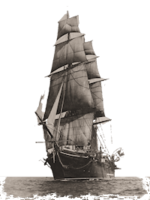April 6th. At four thirty A. M., weighed anchor and steamed down the river, arriving off Bayou Sara, which is about forty-eight miles below the mouth of Red River. Came to anchor and sent two boats on shore in charge of officers, the crews of which were armed, for the purpose of destroying some ten thousand bushels of corn meal and sweet potatoes found piled upon the levee, which had been transported by rebel steamers down the river, and landed there for transportation to the Confederate army at Port Hudson, as we afterwards learned from conversation with the inhabitants of this village, who flocked around us while we were employed making way with it. Every bag, except what we thought proper to take on board the ship for the officers’ and men’s consumption, was thrown into the muddy Mississippi. The villagers thought it hard to destroy this property in this manner, since they had to pay so high for it; but we, not wishing to have it reach the enemy, could not see it in this light. Before finishing this, let me remark that Bayou Sara was once a very handsome spot, but last year guerillas invested it and fired upon our transports, and the iron-clad Essex opened upon the place and laid it in ruins. A few frame buildings and the walls of some brick ones only remain to tell its fate. The remains of these buildings look to the observer like the ruins of some ancient castles in the old world, and the artist might here find a good subject for his pencil and canvas.
At one thirty P. M. got under way again, continuing on our trip down the river until within five miles of Port Hudson, when we turned around and came to anchor. From our anchorage the rebel batteries at Port Hudson, are visible to the eye, and many an officer and blue jacket has remarked that he cannot conceive how we ever stood the concentrated fire of and passed those batteries with so little loss of life and injury to ship, on the night of ever-memorable 14th of March last.
